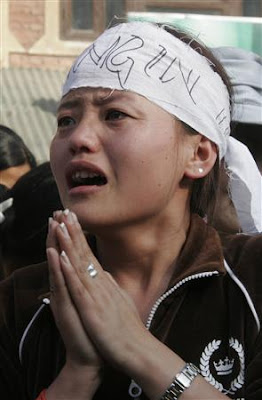




Eighty people have been confirmed dead in the Himalayan region, the Tibetan government-in-exile said at its base in this northern Indian hill town, contradicting the Chinese official report of 10 fatalities in days of unrest.
The dead included 26 people shot near a prison in the Tibetan capital Lhasa, aides to the Dalai Lama said.
"They simply rely on using force in order to simulate peace, a peace brought by force using a rule of terror," the Dalai Lama said in Dharamshala, his home since fleeing Tibet after a failed uprising against Chinese rule in 1959.
The unrest in the vast Himalayan region, which began last week after the 49th anniversary of the 1959 revolt, is the biggest challenge to China's rule there in nearly two decades.
"Please investigate, if possible... some international organisation can try firstly to inquire about the situation in Tibet," the Buddhist spiritual leader said.
"Whether intentionally or unintentionally, some cultural genocide is taking place. There is some kind of discrimination: the Tibetans in their own land quite often are treated as second-class citizens," the Dalai Lama added.
"Some trusted group should go there and see how it happened," added the Dalai Lama, who has long complained that Beijing is flooding Tibet with Han Chinese in order to make the Tibetans a minority in their homeland.
But the Dalai Lama, a Nobel peace laureate, refrained from calling for a boycott of the Beijing Olympics in August, as many Tibetan exiles have been demanding.
"The Chinese people... need to feel proud of it. China deserves to be a host of the Olympic Games," he said, saying however that Beijing also needed to be "reminded to be a good host."
His comments came hours after China declared a "people's war" in Tibet, and as witnesses reported repeated gunfire in the Tibetan capital on Saturday and a huge security build-up by Chinese forces there.
On Sunday, Chinese security forces were said to be patrolling the streets of the now-calm but tense Tibetan capital.
The Dalai Lama also appealed to China to recognise he wanted autonomy for Tibet, and not independence, and that his campaign was non-violent.
"We are not seeking separation -- that, everyone knows," he said.
The unrest in Tibet and a major Chinese crackdown prompted more furious protests on Sunday in Dharamshala, with activists nailing hundreds of Chinese flags to the ground for people to walk on.
"China should stop the brutal crackdown and genocide," said Sonam Darjee, a leader of the Tibetan Youth Congress -- a pro-independence group which views the Dalai Lama's call for greater autonomy as not going far enough.
When asked if he was able to bring an end to Tibetan protests, the Dalai Lama said, "I have no such power."
"It's a people's movement, I consider myself a people's servant, I cannot ask people not to do this, not to do that," he said.
But "everyone knows my principle -- knows (it is) completely non-violence... Violence is almost like suicide."
He denied Chinese charges he was linked to the unrest.
"The Chinese accuse me of creating these problems but I am actually not -- I consider myself a spokesman for the Tibetan people," he said.
At the same time, the Dalai Lama said a growing number of Chinese "are showing solidarity with us."
"Chinese scholars and government officials privately support our 'middle way' approach," he said.
"Genuine harmony must come from the heart on the basis of trust, free of fear."









No comments:
Post a Comment